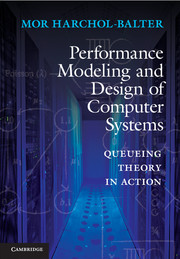Book contents
- Frontmatter
- Contents
- Preface
- Acknowledgments
- I Introduction to Queueing
- II Necessary Probability Background
- III The Predictive Power of Simple Operational Laws: “What-If” Questions and Answers
- IV From Markov Chains to Simple Queues
- V Server Farms and Networks: Multi-server, Multi-queue Systems
- VI Real-World Workloads: High Variability and Heavy Tails
- 20 Tales of Tails: A Case Study of Real-World Workloads
- 21 Phase-Type Distributions and Matrix-Analytic Methods
- 22 Networks with Time-Sharing (PS) Servers (BCMP)
- 23 The M/G/1 Queue and the Inspection Paradox
- 24 Task Assignment Policies for Server Farms
- 25 Transform Analysis
- 26 M/G/1 Transform Analysis
- 27 Power Optimization Application
- VII Smart Scheduling in the M/G/1
- Bibliography
- Index
23 - The M/G/1 Queue and the Inspection Paradox
from VI - Real-World Workloads: High Variability and Heavy Tails
Published online by Cambridge University Press: 05 February 2013
- Frontmatter
- Contents
- Preface
- Acknowledgments
- I Introduction to Queueing
- II Necessary Probability Background
- III The Predictive Power of Simple Operational Laws: “What-If” Questions and Answers
- IV From Markov Chains to Simple Queues
- V Server Farms and Networks: Multi-server, Multi-queue Systems
- VI Real-World Workloads: High Variability and Heavy Tails
- 20 Tales of Tails: A Case Study of Real-World Workloads
- 21 Phase-Type Distributions and Matrix-Analytic Methods
- 22 Networks with Time-Sharing (PS) Servers (BCMP)
- 23 The M/G/1 Queue and the Inspection Paradox
- 24 Task Assignment Policies for Server Farms
- 25 Transform Analysis
- 26 M/G/1 Transform Analysis
- 27 Power Optimization Application
- VII Smart Scheduling in the M/G/1
- Bibliography
- Index
Summary
In Chapter 22 we studied the M/G/1/PS queue and derived simple closed-form solutions for πn, E[N], and E[T] (assuming G is any Coxian distribution).
In this chapter we move on to the M/G/1/FCFS queue. We have already had some exposure to thinking about the M/G/1/FCFS. Using the matrix-analytic techniques of Chapter 21, we saw that we could solve the M/PH/1/FCFS queue numerically, where PH represents an arbitrary phase-type distribution. However, we still do not have a simple closed-form solution for the M/G/1/FCFS that lets us understand the effect of load and the job size variability on mean response time.
This chapter introduces a simple technique, known as the “tagged job” technique, which allows us to obtain a simple expression for mean response time in the M/G/1/FCFS queue. The technique will not allow us to derive the variance of response time, nor will it help us understand the higher moments of the number of jobs in the M/G/1/FCFS – for those, we will need to wait until we get to transform analysis in Chapter 25. Nonetheless, the resulting simple formula for mean response time will lead to many insights about the M/G/1 queue and optimal system design for an M/G/1 system.
The Inspection Paradox
We motivate this chapter by asking several questions. We will come back to these questions repeatedly throughout the chapter. By the end of the chapter everything will be clear.
- Type
- Chapter
- Information
- Performance Modeling and Design of Computer SystemsQueueing Theory in Action, pp. 395 - 407Publisher: Cambridge University PressPrint publication year: 2013



